How woodlands promote my own wellbeing
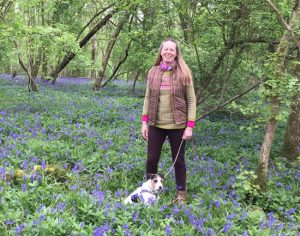 From a personal point of view I know that spending time in a woodland environment benefits my wellbeing. Just being in a woodland environment lulls me into a calmer frame of mind, slows my breathing and my stress levels.
From a personal point of view I know that spending time in a woodland environment benefits my wellbeing. Just being in a woodland environment lulls me into a calmer frame of mind, slows my breathing and my stress levels.
Through immersing myself in nature in woodland I have grown to understand the restorative potential and how enjoying feelings of connection with the wood I experience better connection with myself
Through the experience of benefitting my own wellbeing by spending time on woodland management, helping increase the bio-diversity, I’ve grown to appreciate a symbiotic relationship growing between the wood and myself; we’re both helping each other to thrive.
Research linking woodlands and wellbeing
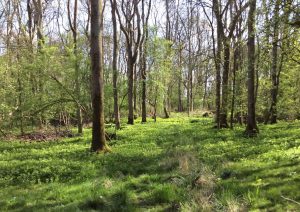 There are studies and literature reviews from many countries beyond ours, including Australia, Japan, the Netherlands, Norway, Sweden and the USA, outlining the contributions of trees, woodlands and green spaces to people’s overall health and well-being.
There are studies and literature reviews from many countries beyond ours, including Australia, Japan, the Netherlands, Norway, Sweden and the USA, outlining the contributions of trees, woodlands and green spaces to people’s overall health and well-being.
Research has shown that wellbeing benefits from spending time in nature include physical, psychological and social aspects, whether through immersion in a natural environment or merely being near to it in the course of everyday activities.
The Woodland Trust published a study in 2013 entitled ‘Healthy woods: healthy lives’ The study isn’t just about the restorative properties of being in woodland related to humans, but recognition of the need for the woodlands to be managed sustainably to provide environmental benefits (e.g. tree planting relating to reduction in flooding).
The Woodland Trust case study urges policy makers to recognise “savings to the public purse” through use of wooded green spaces as a “preventative health care tool”. The study highlights the fact that not everyone has access to woodland, with only 14% of people in England having a wood within 500 metres of home that they are allowed to walk in. The study also highlights a £2.1 billion saving in healthcare costs if every household in England was provided with access to quality green space.
Lack of access to local woodlands is an issue
About 12.9% of Britain’s land surface is wooded (3) and some considerable amount of that woodland is privately owned, much of it not accessible to the general public. If the wood isn’t properly managed then lack of public access may be no bad thing, in relation to health and safety. However, lack of access to local woodlands could be argued as being detrimental to the wellbeing potential for many households in the local area
The healing power of trees
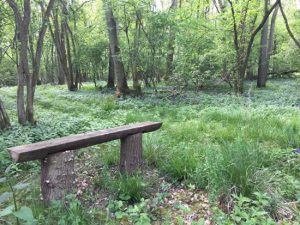 Research has highlighted decreases in depression and feelings of hostility amongst those who practice Shinrinyoku (forest bathing) with indications of benefit to those suffering from some medical conditions such as hypertension and type 2 diabetes.
Research has highlighted decreases in depression and feelings of hostility amongst those who practice Shinrinyoku (forest bathing) with indications of benefit to those suffering from some medical conditions such as hypertension and type 2 diabetes.
Shinrinyoku is practiced by walking in a mindful way through a forest or woodland; the process being to work with the breath to effect connection with the natural environment. However, it’s been shown that simply spending time in the forest can also deliver therapeutic benefits to individuals. “Qualitative assessments of feeling refreshed, relaxed and more comfortable have all been shown to improve after periods in the forest”.
There are a growing number of research studies citing the wellbeing benefits delivered in forests and woodland being linked to the trees giving off organic compounds that support NK (natural killer) cells that are part of the human immune systems way of fighting cancer.
In a 2007 study participants showed significant increases in NK cell activity in the week following a visit to a forest, while after a weekend in the woods the positive effects lasted a month. This ‘forest effect’ is also considered to benefit from the various essential oils (phytoncide) that trees emit to protect themselves from germs and insects. Inhalation of phytoncide it is suggested, from research studies, can improve function of the immune system.
How Woodland Working Parties help promote wellbeing
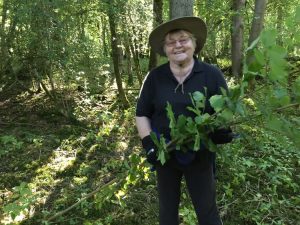 Activities for the group of adults who attend woodland working party sessions include light woodland management tasks, wildlife surveys, woodland crafts, cooking over an open fire and occasional involvement with intergenerational sessions with families with children.
Activities for the group of adults who attend woodland working party sessions include light woodland management tasks, wildlife surveys, woodland crafts, cooking over an open fire and occasional involvement with intergenerational sessions with families with children.
The content of each session is dictated by season and weather and everyone does as much as they feel able to do. There is no expectation for everyone to ‘keep up’ with everyone else and the group are always very supportive of anyone who needs a helping hand.
In the past two months I’ve asked those who have been attending for a minimum period of 5 months to provide some qualitative feedback via a short survey.
Avoiding using the word “wellbeing”, a term not universally understood by all, I posed the question “Can you explain how Woodland Working Parties have benefitted your health and/or positive feelings about yourself/life in general”.
The answers were all in the same vein, for example:
- “They definitely have a therapeutic effect, lifting depression and recharging the batteries”
- “Calming and energizing, helping put some aspects of life into perspective”
- “I sleep better at night”
- “They have increased my confidence and made me feel more alive, ready to face the week ahead”
- “I leave my worries/problems behind”
- “Woodland Working Parties help me feel more positive”
Conversations with those attending sessions revealed that there is real joy experienced through revisiting childhood activities, especially making fires to cook with.
Survey answers showed appreciation of benefits to wellbeing through relaxation and connection with nature reported as experienced through spending several hours each week in the woodland environment.
The simple task of walking around the perimeter fence cutting back brambles has delivered feedback as a way to relax the mind and provide focus, keeping attention in the present. Enjoying the soothing sounds of nature and feeling of being at one with the wood has the effect of calming the mind and lowering anxieties, as one service user put it “letting them blow away on the wind through the trees”.
Observations on how woodlands benefits wellbeing
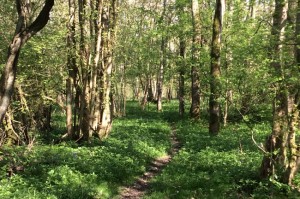 From my own experience there’s certainly something restorative about being involved in woodland working, whether management-task based or through working creatively with wood.
From my own experience there’s certainly something restorative about being involved in woodland working, whether management-task based or through working creatively with wood.
I’m aware that the more I work with objectives linked to improving the wellbeing of the wood, the more the wood delivers wellbeing benefits to me, providing not just relaxation of body and mind but with a feeling of connection and somehow being immersed in a warm and comforting bath.
The feelings of connection are perhaps something everyone has facility for, perhaps rooted in the fact that during evolution we may have acquired some of our DNA from plants.
My observations of how the woodland environment has benefitted the wellbeing of those who spend time in the woodland, I have noticed:
- Being in a woodland promotes relaxation through being able to ‘bathe’ in a restorative environment
- If people are relaxed they are more comfortable with themselves and with others
- When people are comfortable with themselves they are more open to learning and trying new things.
- Submersion in nature soothes the senses and delivers a sense of wellbeing
- Connection with nature promotes interest in care and preservation for future generations.
Involvement in sustainable woodland management has a positive effect on the wellbeing of the woodland and the woodland has a positive effect on the wellbeing of individuals involved; an almost symbiotic relationship is enabled. The connections made with the woodland environment are profound, delivering a sense of deep satisfaction, perhaps harking back to a time when man’s very existence was closely bound up with woodlands.
Come along to a woodland working party and benefit your wellbeing
You can read about one woman’s experience of benefitting wellbeing through joining our woodland working parties
You can listen to an interview about how woodland working grows wellbeing
You can make contact and express interest in coming along
Hope to see you soon.

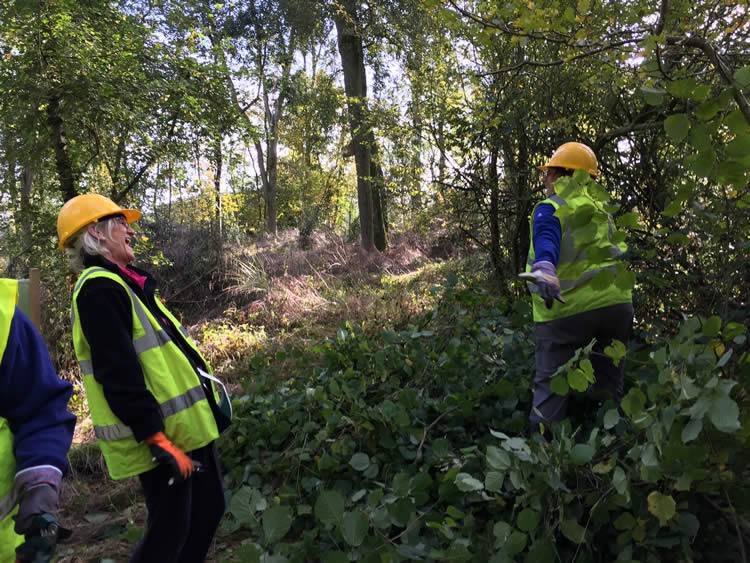
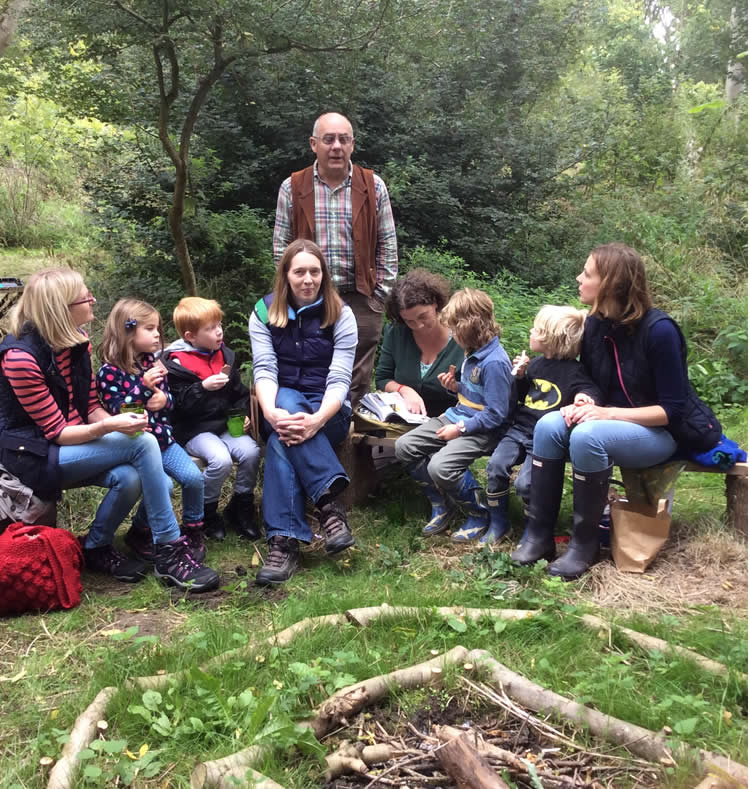

Recent Comments